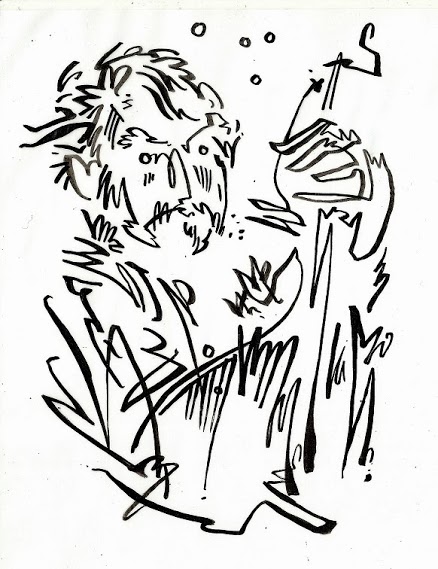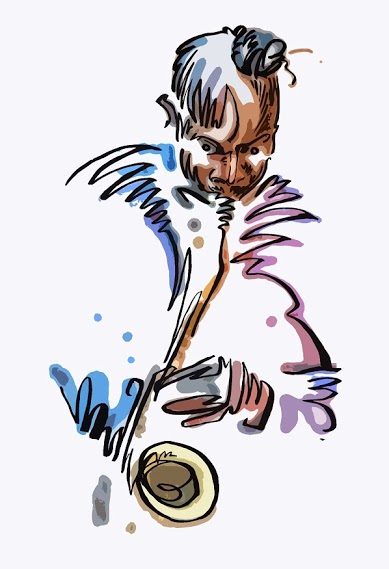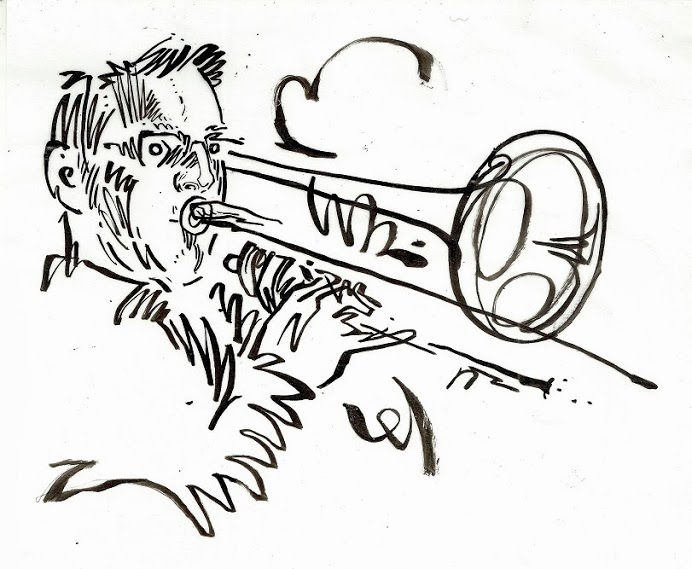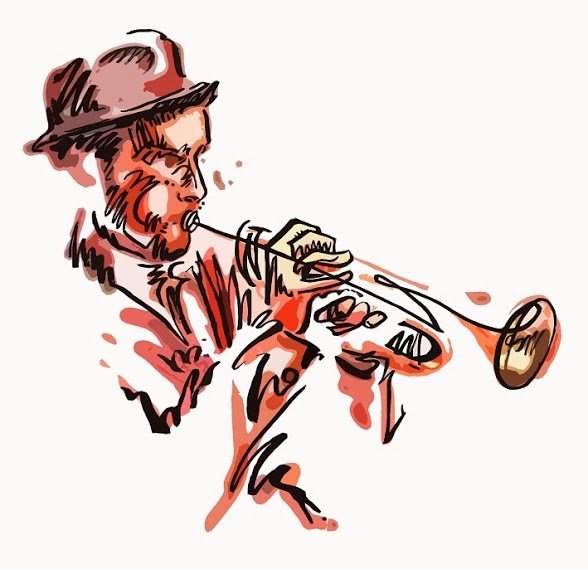It’s party time – again! Following on from last month’s inaugural, anniversary-packed column, another significant celebration is just round the corner: 2013 marks the 21st birthday of the London Jazz Festival. Put it in your diary – it’ll be a blinder.
Despite this time of austerity, the festival and its cohort of sponsors have done a whip round and drummed up enough cash to set up the 21 Commissions programme, which aims to “provide opportunities to artists where opportunities are few, and contribute to the growth of the body of repertoire and development of the art form, through the encouragement of creativity and innovation in music.” Basically, this cash injection means you lucky jazzers will be treated to a vibrant set of concerts by fresh, young talent, including Sons Of Kemet, Tigran Hamasyan, Troykestra, Zoe Rahman, Chris Sharkey and Brass Jaw. It’ll be like Christmas coming early 21 times.
Alongside jazz’s young explorers, there will be a panoply of established stars. Jazz elder statesman Wayne Shorter will be belatedly (for UK audiences, anyway) celebrating his 80th birthday with his inimitable quartet of Danilo Perez (piano), Brian Blade (drums) and John Patitucci (bass). If that wasn’t enough, the quartet will also be joining forces with the BBC Concert Orchestra to play a new repertoire of Shorter’s music.
The Mahavishnu Orchestra guitar supremo John McLaughlin and tabla virtuoso Zakir Hussain will also be observing their own special occasion: theirs is a 40-year friendship and collaboration that will be marked by a Royal Festival Hall performance as Remember Shakti. Elsewhere, saxophonist Lee Konitz, now in his sixth decade as a bandleader, will be re-affirming the cool-school style was, and still is, as valid as the fiery be-bop sound that flourished in the 1940s and 50s.
In the meantime, whet your appetite with this collection of live and LP reviews. My thanks goes out to Alban Low, who produced the stunning artwork in this feature while covering Whirlwind festival.

Richard Bona
Pizza Express, Soho, Friday September 27
Good job Pizza Express’s air conditioning was functioning, because Cameroonian virtuoso bassist/vocalist Richard Bona was radiating considerable warmth: his infectious smile beamed brightly throughout his hour-and-a-half set, and his chameleon-like compositions sizzled, heavily spiced with Brazilian, Cuban, flamenco, funk and pop flavourings.
In this rare UK appearance, Bona re-established himself as one of jazz’s hottest bassists and more approachable composers. The dreadlocked bandleader, a kindred spirit of vocal maestro Bobby McFerrin, carried himself more like a frontman of a pop group than a flashy jazz soloist, thanks to his genial, imposing personality, his casual, shirt-and-jeans outfit and his slickly treated and melodically straightforward bass lines, not to mention his satin-smooth vocals which often prompted neck hairs to stand on end.
Bona and his young band largely dished up tunes from his latest and seventh LP, Bonafied. Being multilingual (he speaks four of Cameroon’s 24 major languages, French, English and a touch of Spanish and Japanese), it came as no surprise Bona’s songs spoke an expansive, universal language. Set opener ‘Janjo La Maya’ transported you to a bustling, Parisian restaurant where waiters dashed and pirouetted. Meanwhile, the Latin dance of ‘Mute Esukudu’ sounded like the Buena Vista Social Club at their most footloose and fancy free.
Improvisation was kept to a minimum, allowing many of Bona’s original tunes to speak for themselves. During the band’s flashing abridgement of Weather Report’s ‘Birdland’, however, Bona’ let rip, spewing hot, high-end notes all over the band’s freewheeling ecstasies.
Whirlwind Festival
Kings Place, King’s Cross, Saturday October 12
Before becoming the jazz entrepreneur he is today, Wisconsin-born Michael Janisch was a gifted athlete. Not only a scholarship-granted american footballer at 20, Janisch could run 400m in 48.6 seconds, just 0.6 seconds outside the 2000 Olympic qualifying time. But after a career-ending but ultimately fortuitous injury, he returned to his favourite childhood occupation: music. Now a virtuoso bassist, label owner, festival director, teacher and producer, Janisch could run rings round the majority of jazz’s key players.
As solo pianist Robert Mitchell wittily commented on Twitter, Janisch’s Olympic-proportioned festival, which featured 18 bands (at least half of which Janisch featured in) and 86 musicians, was “a great week-long fest crammed into three days.” Mitchell’s early afternoon slot on Saturday was a welcome anomaly; in sharp contrast to the fiery jazz ensembles that followed him, his unaccompanied set took in delicately woven, classical-inspired pieces. Tracks like the minor-key ‘The Confession’, which features on his latest, left-hand-only LP, The Glimpse, exuded a quiet menace. His introspective set was later augmented by the theremin-like vocal talents of Bulawayo-born vocalist ESKA, who blew ice over his streams of melodic consciousness.
French guitarist and Berklee graduate Roman Pilon’s lyrical style has charmed, among others, guitar hero Pat Metheny, whose early albums Pilon clearly uses as a springboard. His quartet played with weightless grace: Kansas-based saxophonist Logan Richardson’s bright, loquacious lines surfed atop a breezy rhythm section, which shifted and transformed as lightly as clouds.
New York alto-saxist Patrick Cornelius’s quintet, on the other hand, were rampant throughout. Not for nothing was the dizzyingly intricate opener called ‘Puzzler’. Elsewhere, the self-confessed nerd drew on a disparate collection of personal inspirations: the colour of his daughter’s crayon (‘Infinite Blue’); a “particularly crunchy episode of (supernatural American series) Lost” (‘The Incident’); dealing with stress through meditation (‘In The Quiet Moments’). Whatever the theme, Cornelius’s pure, screaming tone, beautifully counterbalanced by fleet-fingered Brit pianist Jason Rebello’s loose and lyrical lines, was emotionally fulfilling.
The highlight, however, came during Janisch’s third session of the day, in vibraphonist Jim Hart’s superb Cloudmaker Trio. Tense, fierce and sharp minded, Janisch and Robert Plant drummer Dave Smith executed rhythms as if they were going into battle. Hart cooled things down with rapid flurries of icy notes. After the knifey bass runs and hard-edged drumming of ‘Post-Stone’, Hart stepped forward and, quickly examining the crowd, knowingly inquired: "[Is] anybody’s hurt?” After a string of taut, uptempo numbers, the trio eased on the brakes with the dreamy ‘Early Hours’. Despite its unhurried pace, the track, with its stirring bass lines and sheets of intensely glowing vibraphone, proved that, even during the wee hours (when the track was written), Hart’s hyperactive imagination is constantly whirring.

Geir Lysne – New Circle
(ACT)
Listening to Norwegian saxophonist and bandleader Geir Lysne’s (surname pronounced listen) New Circle is the aural equivalent of taking a dip into a copy of National Geographic. The album, Lysne’s sixth on the brilliant ACT label, is an arresting panorama that teems with kaleidoscopic, intercontinental activity. Indeed, throughout, the Old World and the New collide in dazzling and dramatic sound collages, all brought into sharp focus by Lysne’s keen instinct for strong melodies, ethnic grooves and gorgeously addictive textures.
Over the last two decades, Scandinavians have been celebrated for escaping the rigid boundaries of post-bop and jazz-fusion. Like his fellow exploratory kinsmen (including the late, rock-classical-and-jazz-fusing legend Esbjorn Svensson and electronica-harnessing trumpeter Nils Petter Molvaer), Lysne is famed for re-drawing lines on the jazz map. Since his debut album with his Listening Ensemble group, 2002’s Aurora Borealis, however, Lysne has embarked on a different kind of journey to his contemporaries: that of redefining the big band concept.
Naturally, by no means is New Circle a big-band album in the traditional sense. For starters, a relatively compact sextet is at the helm. However, the seven tracks on offer here are wondrously blown-up to orchestral proportions by, as Lysne puts it, a “true master of the computer”, Reidar Skar, who infuses the Europe-via-America-via-Asia-via-Africa compositions with buzzing, bustling digital textures.
With its mind’s-eye aerial snapshots of misty mountains, trumpeting elephants and galloping herds of antelopes, ‘A Million Stars’, the album’s centerpiece, could be the soundtrack to the next Sir David Attenborough series. Meanwhile, the introspective, cinematic Sakn seemingly paints a picture of a meditating Chinese warrior at a crossroads between love and loss.
Arun Ghosh – A South Asian Suite
(Camoci)
Since arriving in 2008 with his spectacular east-meets-west debut, Northern Namaste, Calcutta-born, Bolton-bred clarinettist Arun Ghosh has set the jazz scene on fire. While his speciality blend of traditional south Asian instrumentation and jazz flavouring is nothing new (check out pioneers Joe Harriot and John Mayer’s Indo-Jazz Fusions), Ghosh, who with his silken black locks and flowing traditional attire looks every inch a Bollywood pin-up, has spiced up the template with his own UK-derived influences i.e. the 60s blues boom, Brit-jazz lyricism, and the feral spirit of punk.
Similarly to Brit saxist Courtney Pine, Ghosh wears his roots on his white-robed sleeve, but does so, unlike a number of his other fusioneering contemporaries, with an air of modesty and humour. This remains the case on the excellent A South Asian Suite, Ghosh’s own personal take on the folk and classical music of Bangladesh, Nepal, Pakistan, India and Sri Lanka. And as such, the result is much less “rock” driven than his previous two LPs, with an overarching emphasis on landscapes, spirituality and folk tradition.
The album kicks off with the festive ‘The Gypsies Of Rajasthan’, geed up by Mobo-winning pianist Zoe Rahman’s two-chord vamp and the lively rhythm section of Nilesh Gulhane, Rastko Rasic and Pat Illingworth. It’s soon clear that Ghosh, whose free-flying, tremulous clarinet is largely front and centre, wouldn’t have reached the album’s rarefied heights without help from his musically like-minded friends. Rahman’s younger brother, Idris (who has featured on all three of Ghosh’s LPs), provides the perfect foil to Ghosh’s swirling riffs, with stinging, sitar-like alto sax lines.
Ghosh has in the past been criticised for his unvarying approach to composition. In this instance, that accusation is way off the mark. From first to last A South Asian Suite is nothing but well-paced, dynamic, evocative and transformative. Outstanding tracks come thick and fast. Tranquil, soul-searching moments like ‘After The Monsoon’ and ‘Mountain Song’ are gorgeously contrasted by the likes of the ecstatic, devotional dance of ‘Sufi Stomp (Soul Of Sindh)’. But the best is saved for last: the blistering death march of “Journey South” will rip your nerves to shreds. Clear contender for album of the year.

Ahmad Jamal – Saturday Morning
(Jazz Village)
Early on in his career, octogenarian bandleader Ahmad Jamal was misunderstood by some snooty jazz critics who dismissed him as a glorified cocktail-bar pianist. Despite his detractors, there was at least one man who championed his cool, Zen-like style: trumpeter and innovator Miles Davis. Though the pair never collaborated (oh, the potential), Davis admitted he admired Jamal’s rhythmic sense and his “concept of space, his lightness of touch, his understatement…" All of which are still, now more than ever, shining components of Jamal’s breathtaking talent.
Saturday Morning is the follow-up to 2012’s critically acclaimed Blue Moon, and picks up where its predecessor left off, all funk-rock grooves encompassed by romantic balladry and tightly wound ostinatos, not to mention a dusting of Afro-Caribbean percussion. It all begins with the fittingly titled ‘Back To The Future’, which could be the album’s subtitle, since, thematically and stylistically, it moves back and forth freely through the decades, encompassing the 50s to the present day.
With its compact, quirky chord dashes and modern, hard-rocking groove, the aforementioned opener should prompt Robert Glasper to take a long, hard look in the mirror. Jamal’s cool command of a sailing melody and straightforward beat, his trademark since his 1958 hit, ‘Poinciana’, is evident on the likes of the title track, which was written, funnily enough, in Jamal’s home on a Saturday, and apparently conjures, much like the album’s front-cover, a brilliant rising sun illuminating crisp, morning air. Elsewhere, Duke Ellington’s “I Got It Bad And That Ain’t Good” is virtually an Ellingtonian mash up; in it, Jamal cleverly blends snippets from two other 1941 Duke standards – ‘Take The ‘A’ Train’ and ‘Just Squeeze Me’ – to effervescent effect. Jamal’s original detractors should be eating their words.
Oddarrang – In Cinema
(Edition)
When they appeared at last year’s London Jazz Festival, Finnish five piece Oddarrang seemed a touch out of place. Purveyors of minimal yet expansive post-rock, it felt the quirky ensemble of electric guitar, bass, drums, trombone and cello would have been more suited to sharing a stage with, say, glacial art rock giants Sigur Ros, than piano child prodigy Tigran Hamasyan. Nonetheless, despite the feeling that the band had been misplaced, they delivered a stunning (albeit short) set of haunting, cathartic tone poems which lingered long in the memory.
A year later, they’ve returned with the brilliantly elegiac In Cinema, featuring, naturally, music originally scored for the silver screen. The album’s filmic, deeply Nordic sound will be a perfect companion to usher you into the darker, winter months.
Before assembling this supergroup of-sorts, bandleader (drums, piano, synths, harmonium) Olavi Louhivuori had a stint as sticksman for Polish ECM trumpeter Tomasz Stanko. Evidently, Louhivuori has siphoned off Stanko’s sense of space and ear for a slowly unfurling melody. Flashbacks of Norwegian guitarist Terje Rypdal’s 1975 benchmark, Odyssey, are also central to In Cinema, notably on the dense, pulverising grandeur of ‘Self Portrait’. On ‘The Sage’, the drama reaches soul-stirring, ear-drum-bursting levels, like Mogwai hijacking an ECM session. Both rockers and jazzers will find common ground on this mesmerising LP.


